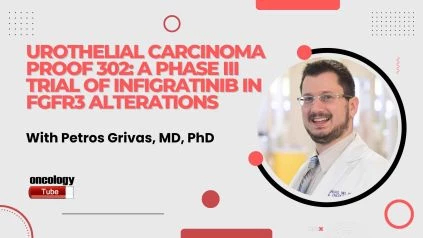Petros Grivas, MD, PhD, an expert in urothelial carcinoma (UC) research at the University of Washington, has made significant contributions to the understanding of fibroblast growth factor receptor 3 (FGFR3) alterations in the context of PROOF 302, a phase III clinical trial evaluating the efficacy of infigratinib (BGJ398) as adjuvant therapy for invasive UC patients.
Invasive UC is a type of bladder cancer that has spread beyond the inner layer of the bladder. The treatment landscape for UC has evolved rapidly in recent years, with the discovery of FGFR3 alterations offering new therapeutic opportunities. FGFR3 is a receptor protein that plays a crucial role in cell growth and division.
However, alterations in FGFR3, such as mutations or gene fusions, can result in abnormal activation of signaling pathways and contribute to the development and progression of UC.
The PROOF 302 trial aimed to assess whether infigratinib, a selective FGFR inhibitor, could improve outcomes when used as adjuvant therapy after surgical removal of invasive UC tumors.
Dr. Grivas and his team investigated the prevalence and clinical implications of FGFR3 alterations in the trial population.
Their research revealed that approximately 40% of patients with invasive UC had FGFR3 alterations, including mutations and fusions. These alterations were associated with specific clinical characteristics, such as lower tumor stage and grade, as well as a higher likelihood of recurrence.
The findings indicated that FGFR3 alterations could serve as important biomarkers for patient stratification and targeted therapy in invasive UC.
Furthermore, Dr. Grivas and his colleagues assessed the efficacy of infigratinib in patients with FGFR3-altered invasive UC. The results showed promising outcomes, with significantly improved disease-free survival observed in patients receiving infigratinib compared to those receiving a placebo.
The data suggested that infigratinib has the potential to become a valuable adjuvant therapy option for this patient population.
Dr. Grivas’s research has shed light on the role of FGFR3 alterations in invasive UC and has emphasized the importance of personalized medicine approaches targeting specific molecular abnormalities.
By identifying FGFR3 alterations as potential biomarkers, he has paved the way for precision medicine strategies that can improve treatment outcomes and patient prognosis.
In conclusion, Dr. Petros Grivas, through his extensive work on FGFR3 alterations in the context of PROOF 302, has provided valuable insights into the biology of invasive UC and the potential of infigratinib as an adjuvant therapy.
His findings have not only expanded our understanding of UC but have also laid the groundwork for personalized treatment approaches that harness the power of molecularly targeted therapies.

